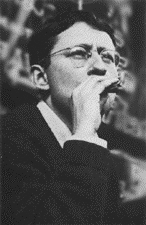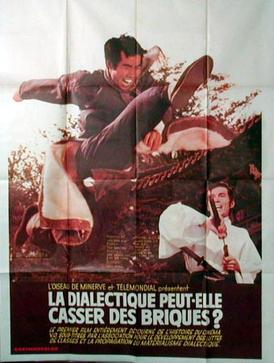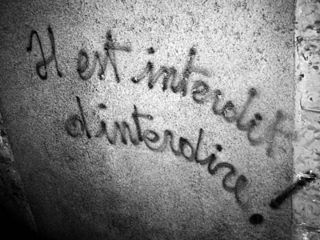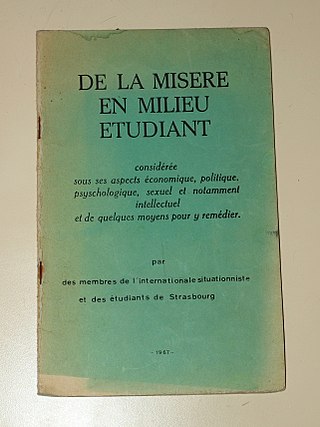Related Research Articles

The Situationist International (SI) was an international organization of social revolutionaries made up of avant-garde artists, intellectuals, and political theorists. It was prominent in Europe from its formation in 1957 to its dissolution in 1972. The intellectual foundations of the Situationist International were derived primarily from libertarian Marxism and the avant-garde art movements of the early 20th century, particularly Dada and Surrealism. Overall, situationist theory represented an attempt to synthesize this diverse field of theoretical disciplines into a modern and comprehensive critique of mid-20th century advanced capitalism.

Guy-Ernest Debord was a French Marxist theorist, philosopher, filmmaker, critic of work, member of the Letterist International, founder of a Letterist faction, and founding member of the Situationist International. He was also briefly a member of Socialisme ou Barbarie.

May 68 refers to a period of civil unrest that occurred throughout France from May to June 1968. Beginning in May 1968, a period of civil unrest occurred throughout France, lasting seven weeks and punctuated by demonstrations, general strikes, and the occupation of universities and factories. At the height of events the economy of France came to a halt. The protests reached a point that made political leaders fear civil war or revolution; the national government briefly ceased to function after President Charles de Gaulle secretly fled France to West Germany on the 29th. The protests are sometimes linked to similar movements around the same time worldwide that inspired a generation of protest art in the form of songs, imaginative graffiti, posters, and slogans.
The Enragés, commonly known as the Ultra-radicals, were a small number of firebrands known for defending the lower class and expressing the demands of the radical sans-culottes during the French Revolution. They played an active role in the 31 May – 2 June 1793 Paris uprisings that forced the expulsion of the Girondins from the National Convention, allowing the Montagnards to assume full control. The Enragés gained their name for their angry rhetoric appealing to the National Convention to take more measures that would benefit the poor. Jacques Roux, Jean-François Varlet, Jean Théophile Victor Leclerc and Claire Lacombe, the primary leaders of the Enragés, were strident critics of the National Convention for failing to carry out the promises of the French Revolution.

Anti-art is a loosely used term applied to an array of concepts and attitudes that reject prior definitions of art and question art in general. Somewhat paradoxically, anti-art tends to conduct this questioning and rejection from the vantage point of art. The term is associated with the Dada movement and is generally accepted as attributable to Marcel Duchamp pre-World War I around 1914, when he began to use found objects as art. It was used to describe revolutionary forms of art. The term was used later by the Conceptual artists of the 1960s to describe the work of those who claimed to have retired altogether from the practice of art, from the production of works which could be sold.

Isidore Isou, born Isidor Goldstein, was a Romanian-born French poet, dramaturge, novelist, film director, economist, and visual artist. He was the founder of Lettrism, an art and literary movement which owed inspiration to Dada and Surrealism.
The Sorbonne Occupation Committee was a politically radical student group that occupied the Sorbonne during the May 1968 events in France.

La dialectique peut-elle casser des briques ?, in English, "Can Dialectics Break Bricks?", is a 1973 Situationist film produced by the French director René Viénet which explores the development of class conflict through revolutionary agitation against a backdrop of graphic kung-fu fighting.

René Viénet is a French sinologist who is famous as a situationist writer and filmmaker. Viénet used the situationist technique of détournement — the diversion of already existing cultural elements to new subversive purposes.

Communization theory refers to a tendency on the ultra-left that understands communism as a process that, in a social revolution, immediately begins to replace all capitalist social relations with communist ones, rejecting transitional stages. Thus it rejects the role of the dictatorship of the proletariat, which it sees as reproducing capitalism. There exist two broad trends within communization theory: a ‘Marxist’ one and an ‘Anarchist’ one.

Gilles Dauvé is a French ultra-left political theorist, school teacher, and translator, associated with the development of communization theory.

Michèle Bernstein is a French novelist and critic, most often remembered as a member of the Situationist International from its foundation in 1957 until 1967, and as the first wife of its most prominent member, Guy Debord.
The Girls of Kamare (1974) is a Situationist film by René Viénet. Unlike Viénet's previous work, Can dialectics break bricks? (1973), The Girls of Kamare includes original 16 mm hardcore inserts shot by Viénet. The title is a pun on the famous French bawdy song Les Filles de Camaret.

Combat was a French newspaper created during the Second World War. It was founded in 1941 as a clandestine newspaper of the French Resistance.

On the Poverty of Student Life: A Consideration of Its Economic, Political, Sexual, Psychological and Notably Intellectual Aspects and of a Few Ways to Cure it is a pamphlet first published by students of the University of Strasbourg and the Situationist International (SI) in 1966. Attacking the subservience of university students and the strategies of student radicals, it caused significant uproar, led to the dissemination of Situationist ideas, and precipitated the events of May 1968 in France.
Chinese People, One more effort, to be revolutionaries! a.k.a. Peking Duck Soup is a 1977 film by Situationist director René Viénet.

Report on the Construction of Situations is the founding Manifesto of the Situationist International revolutionary organization. The pamphlet was published by Guy Debord in June 1957, and the following month the organization was founded in Cosio d'Arroscia, Italy.

Socialisme ou Barbarie was a French-based radical libertarian socialist group of the post-World War II period whose name comes from a phrase which was misattributed to Friedrich Engels by Rosa Luxemburg in the Junius Pamphlet, but which probably was most likely first used by Karl Kautsky. It existed from 1948 until 1967. The animating personality was Cornelius Castoriadis, also known as Pierre Chaulieu or Paul Cardan. Socialisme ou Barbarie is also the name of the group's journal.
A workers' council, also called labor council, is a type of council in a workplace or a locality made up of workers or of temporary and instantly revocable delegates elected by the workers in a locality's workplaces. In such a system of political and economic organization, the workers themselves are able to exercise decision-making power. Furthermore, the workers within each council decide on what their agenda is and what their needs are. The council communist Antonie Pannekoek describes shop-committees and sectional assemblies as the basis for workers' management of the industrial system. A variation is a soldiers' council, where soldiers direct a mutiny. Workers and soldiers have also operated councils in conjunction. Workers' councils may in turn elect delegates to central committees, such as the Congress of Soviets.
Jacques Pimpaneau was a French scholar of Chinese. He was Chair of Chinese Language and Literature at INALCO, Paris.
References
- 1 2 3 Viénet, René (1992) [1968]. "The "Council for Maintaining the Occupations" and Councilist Tendencies". Enragés and Situationists in the Occupations Movement. Translated by Loren Goldner; Paul Sieveking. New York: Autonomedia. Archived from the original on 17 March 2004.
- ↑ Mustapha Khayati, René Riesel, Christian Sébastiani, Raoul Vaneigem, René Viénet (September 1969). "The Beginning of an Era". Internationale Situationniste. Translated by Ken Knabb. Archived from the original on 22 February 2004.
{{cite web}}: CS1 maint: multiple names: authors list (link)